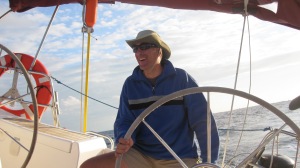Blog Archives
Sailing from Fort Lauderdale to Bahamas
Watch a video of this sail here .
.
“You’ve got to be thinking about sailing.” That was the constant reminder of Bill, our skipper and instructor as we steered a course from Fort Lauderdale to Bimini, Bahamas. This was a week-long course offered by the Blue Water Sailing School. We were a crew of four aboard a Dufour Gib’Sea 51, a cruiser-racer.
Skipper Bill’s simple reminder is that we need to tune our senses to the boat, the sky and the sea. There are telltales everywhere. Lines of seaweed tell us the direction of the current. Wisps of cirrus clouds help us forecast the weather. A flutter at the luff of the main tells us it’s getting backwinded by the jib. The elements around us are speaking, not necessarily to us, but if we care to listen, we can fine tune a boat to find that perfect balance among the wind and the waves.
Bill was a continual source of sailing knowledge and humor. When we were in pitched seas and asking if the sails were properly trimmed, he said, “Let go of the wheel.” The boat answered our question by continuing its course, not seeming to need our mits on the wheel. A big part of a sailor’s education is understanding how to prepare a boat to sail rather than how to sail the boat. Learning this takes time at sea. So, we boarded Gitana, slipped her lines and headed for open water via the canals of Fort Lauderdale, a gaudy display of how the One Percent live. The city’s canals look like Venice if it were designed by the Kardashians. Three drawbridges later and we made our final turn toward Atlantic.
The Gib’Sea 51 has twin wheels in the cockpit. This configuration seemed perfect for me and reminded me of driving school. I thought that if we’re feeling overwhelmed or about to make a ‘chowderhead’ move, no problem, Skipper will take over with the other wheel. Nope. He was not about to deprive us of a teachable moment, so he let us learn by our mistakes.
Like oversteering the boat. We all did it. Watch the video. Instead of anticipating the waves, steering into them and allowing the forces to push us back on track, we grabbed at the wheel with bare knuckles. The harder we worked at steering straight, the wider was our serpentine path. “Let go of the wheel.” We were learning how to find that balance with the forces, rather than to fight them.
Shortly after entering the Atlantic, the sun set. As the Gulf Stream surged north at about two and a half knots. A 20-knot wind from the north pushed up the swells so they looked like a parade of elephants marching across the dusky horizon. We sailed all night, wearing harnesses that tethered us to the cockpit. We each took 30-minute shifts at the wheel. After we’d had a few turns at the wheel, Skipper went below to his bunk. Occasionally, I’d go below, grabbing a handrail with every step to keep from being hurled across the cabin. Bill was stretched across his bunk, relaxed and reading from his Kindle. Later in the evening I hit a beauty of a wave that sent Skipper flying from his bunk to the deck.
We steered by compass and the stars. No cheater GPS for students. In spite of the wind, the waves and the current, we arrived exactly where we were headed. It was a proud accomplishment. We hoisted the orange Q flag to signify that we had not yet cleared customs and got some sleep. The next day we sailed into Bimini, where Earnest Hemingway would go to hunt the big fish. Our passports were stamped, the Q (Quarantine) came down, the Bahaman flag went up, and we went ashore for beer, Cubans, lobster and conch.
Again, the lines were slipped and we were sailing The Bahamas. Postcard clear water, sapphire, richly infused by tropical sunlight. We practiced all points of sail, man-overboard drills, the perfection of sail trim, anchoring. By the end of the week, I expanded my at-sea comfort zone with hours behind the wheel under varied and challenging conditions. I had earned my American Sailing Association 106, Advanced Coastal Cruising certification. Through it all, I had the privilege of making some great friends. We came from Tennessee, Missouri, Colorado and the District of Columbia. We brought different sailing skills, experiences and goals, yet we gelled as a crew. We shared a small space for a week without a dip in the humor or the good conversation. I’d welcome any opportunity to sail with them again.
I would like to thank Blue Water Sailing School for a wonderful week of sailing. Special thanks to Skipper whose Oklahoma wisdom, good sense and drawl serve him and his crew well. I’d recommend Blue Water Sailing School to anyone looking to take sailing to the next step.